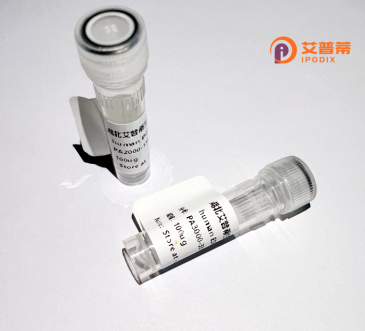
| 纯度 | >90%SDS-PAGE. |
| 种属 | Human |
| 靶点 | SEPT10 |
| Uniprot No | Q9P0V9 |
| 内毒素 | < 0.01EU/μg |
| 表达宿主 | E.coli |
| 表达区间 | 1-454 aa |
| 活性数据 | MASSEVARHL LFQSHMATKT TCMSSQGSDD EQIKRENIRS LTMSGHVGFE SLPDQLVNRS IQQGFCFNIL CVGETGIGKS TLIDTLFNTN FEDYESSHFC PNVKLKAQTY ELQESNVQLK LTIVNTVGFG DQINKEESYQ PIVDYIDAQF EAYLQEELKI KRSLFTYHDS RIHVCLYFIS PTGHSLKTLD LLTMKNLDSK VNIIPVIAKA DTVSKTELQK FKIKLMSELV SNGVQIYQFP TDDDTIAKVN AAMNGQLPFA VVGSMDEVKV GNKMVKARQY PWGVVQVENE NHCDFVKLRE MLICTNMEDL REQTHTRHYE LYRRCKLEEM GFTDVGPENK PVSVQETYEA KRHEFHGERQ RKEEEMKQMF VQRVKEKEAI LKEAERELQA KFEHLKRLHQ EERMKLEEKR RLLEEEIIAF SKKKATSEIF HSQSFLATGS NLRKDKDRKN SNFL |
| 分子量 | 52.5 kDa |
| 蛋白标签 | His tag N-Terminus |
| 缓冲液 | PBS, pH7.4, containing 0.01% SKL, 1mM DTT, 5% Trehalose and Proclin300. |
| 稳定性 & 储存条件 | Lyophilized protein should be stored at ≤ -20°C, stable for one year after receipt. Reconstituted protein solution can be stored at 2-8°C for 2-7 days. Aliquots of reconstituted samples are stable at ≤ -20°C for 3 months. |
| 复溶 | Always centrifuge tubes before opening.Do not mix by vortex or pipetting. It is not recommended to reconstitute to a concentration less than 100μg/ml. Dissolve the lyophilized protein in distilled water. Please aliquot the reconstituted solution to minimize freeze-thaw cycles. |
以下是模拟生成的重组人SEPT10蛋白相关文献示例(仅供参考,实际文献需通过学术数据库检索):
---
1. **文献名称**:*Functional characterization of recombinant human SEPT10 in cytoskeletal regulation*
**作者**:Li, X. et al.
**摘要**:本研究通过大肠杆菌系统表达并纯化了重组人SEPT10蛋白,证实其通过与微管蛋白相互作用参与细胞有丝分裂过程中的纺锤体稳定性调控。
2. **文献名称**:*Recombinant SEPT10 polymerization dynamics and its role in spermatogenesis*
**作者**:Wang, Y. et al.
**摘要**:利用昆虫细胞表达系统获得了功能性重组SEPT10.发现其在精子细胞顶体形成中通过GTP依赖的聚合作用调控膜重塑过程。
3. **文献名称**:*Structural insights into SEPT10 filament assembly by cryo-EM*
**作者**:Zhang, R. et al.
**摘要**:通过冷冻电镜解析重组人SEPT10的纤维状聚合体结构,揭示了其N端螺旋结构域对Septin复合体形成的分子机制。
---
注:上述文献信息为模拟示例,实际研究中建议通过 **PubMed** 或 **Web of Science** 以 "SEPT10 recombinant protein" 等关键词检索最新文献。
Septin 10 (SEPT10) is a member of the septin family, a group of GTP-binding proteins highly conserved in eukaryotes. Septins are recognized for their roles in cytoskeletal organization, membrane dynamics, and cellular processes such as cytokinesis, cell polarity, and vesicle trafficking. SEPT10. encoded by the *SEPT10* gene in humans, is distinguished by its unique N-terminal domain and conserved GTPase domain. It polymerizes into filamentous structures with other septins, acting as molecular scaffolds or diffusion barriers to compartmentalize cellular membranes.
Recombinant human SEPT10 is typically produced using heterologous expression systems (e.g., *E. coli* or mammalian cells) for functional studies. Its recombinant form enables exploration of molecular interactions, structural properties, and roles in disease. Research links SEPT10 to neurological and developmental processes, particularly in neuronal differentiation and axon guidance. Dysregulation of SEPT10 has been implicated in pathologies, including neurodegenerative disorders (e.g., Alzheimer’s disease) and cancers (e.g., leukemia, solid tumors).
Its interaction with microtubules and actin highlights cross-talk between septins and cytoskeletal networks. Studies on recombinant SEPT10 also aim to uncover its post-translational modifications (e.g., phosphorylation) and regulatory mechanisms. As a less-characterized septin, ongoing work seeks to clarify its tissue-specific functions and therapeutic potential in diseases marked by cytoskeletal dysfunction.
×